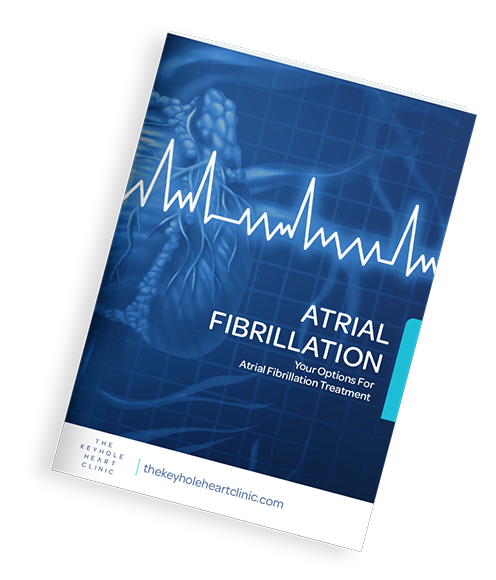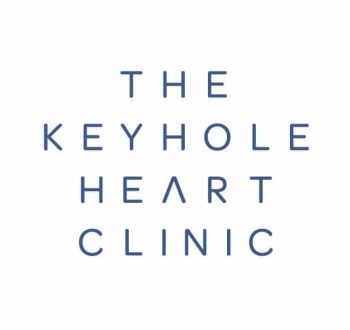Ablation of Atrial Fibrillation
Keyhole surgical ablation is far more effective in the short and long term and should be considered if catheter pulmonary vein isolation does not work. We would not advise continued medical control if there is a good chance that the Atrial Fibrillation can be cured.
Something to bear in mind is that Catheter ablation is not an effective therapy for permanent Atrial Fibrillation. When the rate of atrial fibrillation cannot be controlled with drugs, a different strategy is sometimes required where the conduction system that connects the fast beating atrial chambers (the AV node) can be disconnected from the big muscular ventricles. This is called AV Node Ablation. The heart rate must be restored using a permanent pacemaker, but unfortunately, the efficiency of the heart’s normal function cannot be restored using this therapy. We do not advise AV node ablation without first considering a surgical strategy for Atrial Fibrillation Ablation. It is also vital to exclude the presence of leaking heart valves (especially one valve called the mitral valve), as this may require surgical repair in order to ever have any chance of alleviating the Atrial Fibrillation.
Surgical treatment of Atrial Fibrillation (Maze procedure):
Pulmonary vein isolation for the treatment of Atrial Fibrillation is a very effective therapy. In patients with Paroxysmal Atrial Fibrillation, Keyhole Atrial Fibrillation ablation can be performed. Clinicians are beginning to realize that when catheter-based therapies fail to control Atrial Fibrillation in its early phase, surgical ablation should be offered as an effective solution to Atrial Fibrillation and Strokes.
In more advanced diseases where Atrial Fibrillation can become permanent, surgical therapies are very effective in experienced hands and should be considered in suitable patients. Patients undergoing any form of heart surgery should be considered for surgical Atrial Fibrillation Ablation at the same time.
Stand-alone surgery (i.e. Atrial Fibrillation Ablation only) should be considered for symptomatic patients who prefer a surgical approach. They may have failed one or more attempts at Catheter ablation or are not suitable candidates for Catheter ablation.

Otherwise known as an abnormal heart rhythm that causes irregular and rapid beating of the atrial chambers of the heart. With complications including heart failure, stroke and dementia, atrial fibrillation is a heart condition that should be assessed by a professional. We have produced a detailed guide including all you need to know regarding the condition. Don’t hesitate to download the guide for more information or get in touch to book an appointment.
What are the Atrial Fibrillation Ablation procedure risks?
Like with any surgery, there are of course some risks. These can vary, from small issues – such as bleeding around where the surgical site or where the catheter was inserted – to more serious issues, such as a stroke or heart attack. While the Atrial Fibrillation Ablation procedure risks are small when completed in the hands of professionals, we would still highly recommend talking to your doctor before undertaking the surgery about the Atrial Fibrillation ablation stroke risks, so that you can fully understand the risks and benefits before committing to the surgery.
Is Atrial Fibrillation ablation dangerous? No, but like many technical medical procedures on delicate organs, complications can arise due to the nature of the treatment.
What is the Atrial Fibrillation Ablation recovery period like?
The Atrial Fibrillation ablation recovery period is very manageable and should not cause too much inconvenience for you. If you opt for a Catheter ablation for Atrial Fibrillation, you will rest quietly for a few hours before you are allowed to return home. Usually, you can leave for home on the same day of the surgery. You may feel slightly sore, but you can usually return to work and your daily activities within just a few days. You can read our patient testimonials to learn about how others have experienced surgery here at The Keyhole Heart Clinic.
If you have the Surgical Maze procedure performed by keyhole heart surgery, your recovery time will still be very quick but you will need to stay in hospital for 3 or 4 days. However, the results will be far better than with the Catheter ablation method. When discussing your options with your doctor, they will explain and warn you about all aspects of the Atrial Fibrillation Ablation recovery period.
If you have further questions about any types of heart surgery that we offer, or if you want to chat to one of our friendly team, please feel free to get in touch and someone will get back to you as soon as possible.
